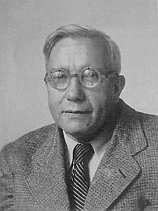Ethnologist, linguist. Born in Vienna (Austria) 25 May 1888, died Vienna (Austria) 27 April 1963. As the twelfth child of a civil servant, Wölfel could not have access to higher education. After a period of individual study he became teacher of languages, and in 1916 entered the Austrian Ministry of Trade as translator. In 1919 he read anthropology and ethnology with Father Wilhelm Schmidt as a special university student in Vienna, and following completion of his qualifying examinations, was awarded a doctorate in 1925 with a dissertation on trepanation. The next year he entered the service of the Museum für Völkerkunde in Vienna, where he worked first as assistant and later as curator. Through the help of the Berlin anthropologist Eugen Fischer, Wölfel was able to undertake research trips after 1930, visiting the most important archival collections in Europe as well as the Canary Islands, with whose investigation he chiefly concerned himself. In 1931, he was made an honorary memeber of the Instituto de Estudios Canarios and the Museo Canario. From 1939 to 1945, he was placed on pension for political reasons. Because of wartime conditions, Wölfel was obliged to decline a chair at the University of San Fernando, La Laguna, Tenerife, offered to him in 1941. The university nonetheless named him as adjunct professor.
In 1945 he became a Privatdozent at the University of Vienna and resumed his former position at the Museum für Völkerkunde. A severe heart condition as well as progressive impairment of vision forced him to abandon teaching in 1953. In 1960, the University of La Laguna bestowed an honorary doctorate upon him. Using ethnological and linguistic methods, Wöfel sought to solve the problems of the megalithic cultures and to reconstruct the prehistoric cultural strata. He viewed the European megalithic as the most significant level of high culture and its religion (defined by ancestral worship and belief in a supreme god) as the world's most ancient. For him, languages were both the point of departure and the source of pivotal information. Wölfel considered the language of the original inhabitants of the Canary Islands in an historical comparative manner especially with the Berber languages (but also with ancient Egyptian, Hausa and the Cushitic language group) to see if commonly inherited cultural elements could be deduced. In his hypothesis of an Atlanto-Libyan linguistic unity stretching from North Africa to pre-Indo-Germanic Europe, Wölfel contributed to research into the substrata of European languages, inspite of being well aware that many of his proposals were contestable.
(text written by Herrmann Jungraithmayr and Rudolf Leger, by courtesy of Berthold Riese; photo source: http://www.afrikanistik.at/personen/woelfel_dominik_josef.htm)



